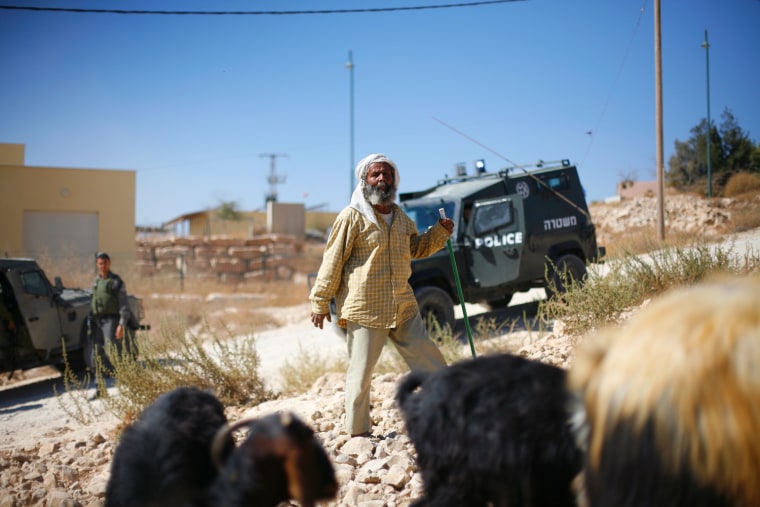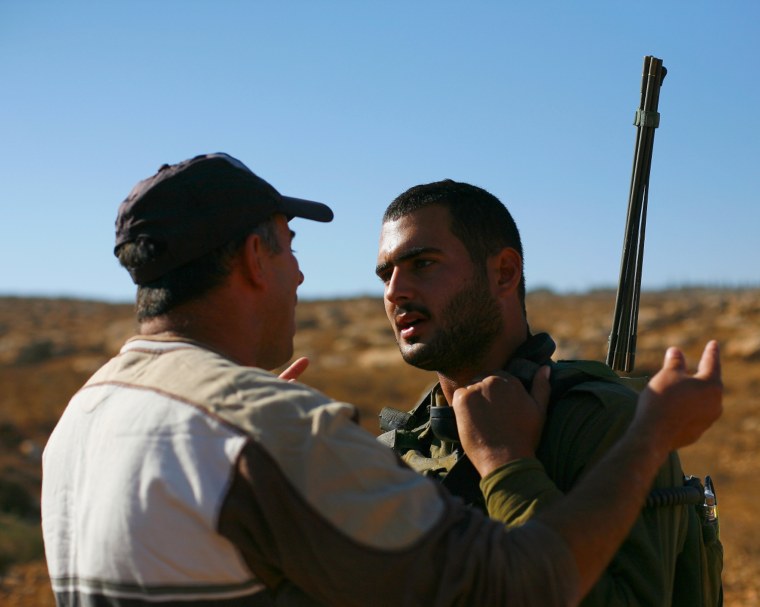TOUBA, West Bank - Shepherds on the scrubby hills of Hebron eke out a living tending sheep, goats and a few camels in much the same way their ancestors did centuries ago.
On a recent morning shepherd Mahmoud Awad pointed to a heavily pregnant ewe.
“Come, come, quickly, quickly,” he shouted. “Baby, baby!” Within minutes he had delivered a lamb barehanded.
While helping bring new life into the world, Awad and others in this tiny community deep in the occupied West Bank are struggling to cling onto their livelihoods.
For years Awad, 34, and his extended family who live in tents and limestone caves say they have been persecuted by residents of the Israeli settlement of Maon. There are frequent reports of harassment and incursions by settlers and soldiers. Palestinians often rely on peace activists to escort children to school and farmers to their fields.
“It is getting worse and worse. The settlers are controlling more and more land and spreading to more areas,” said Guy Butavia, an activist with human rights organizations Ta’ayush and Rabbis for Human Rights. “Since the beginning of the year, the election, (the settler movement) has got more power.”
Israeli settlements on land occupied after the 1967 Arab-Israeli war are considered illegal by most governments around the world, althoughIsrael disputes this. With some 500,000 Israelis living alongside around 2.5 million Palestinians, the settlements on land Palestinians hope one day will form their state are considered a major roadblock in U.S.-sponsored peace talks.
On Wednesday, Secretary of State John Kerry urged Israel to limit settlements.

"Let me emphasize at this point the position of the United States of America on the settlements is that we consider them... to be illegitimate," he said, reaffirming long-standing U.S. policy.
Policy or not, Awad and his family have deep ties to the West Bank.
“We’ve been here for 250 years, my great grandfather, my grandfather, they both lived for 110 years,” he said. “I was born here in a cave.”
When unauthorized Israeli settlers first came to the area in the 1980s, the communities coexisted, but in recent decades the relationship Israelis and Palestinians soured, Awad says.
And last year Awad was attacked by a knife-wielding settler from Maon, he says.
“I was riding my donkey back from seeing the doctor in nearby Hebron. He jumped out of the bushes near Maon and just stabbed me.”
Awad lifted his shirt to show a wound in his side.
His brother Ali Awad says life was better before the Israelis arrived.
“My grandfather and my father were always living in this area. This land did not belong to the settlers before, this land is Palestinian, and it is ours,” he said as he watched his animals being brought in for the night. “This is our life as farmers, we raise sheep, we plow the land. How can the settlers come from Europe, holding documents, and say that this is their land?”
Nearby Jimba, a village made up mostly of sheep pens, a few tents and concrete buildings, lies inside a firing range for the Israel Defense Forces (IDF). Residents and the Israeli military struggled for control of the scrubby patch of land ever since it was declared a closed zone.
In early 2013, the Israeli court passed a temporary ruling halting the eviction of Palestinian residents from the area, pending the end of the case.
Nevertheless, residents still face almost daily harassment from nearby settlers, said Khaled Jabarin, a shepherd from Jimba.
“Forget the court orders, the settlers are still shooting at us,” he said.
Representatives of the nearby settlement of Har Hevron did not respond to requests for comment on the issue.
While the Israeli court order halted evictions, the IDF is still responsible for stopping ongoing illegal construction in the area, according to a spokesman for the Israeli military.
“The temporary order does not prohibit enforcement measures against illegal building nor prevent ongoing training activities in the area,” the spokesman said.
Palestinians, meanwhile, continue trying to use the land. Ezra Mawi, an Israeli activist working with rights group Ta’ayush, says he fields calls for help from locals every day.
“The settlers want the land, they feel that the land belongs to them. Behind everything, it’s money, it’s property, it’s profit,” he said. “Don’t tell me stories about the Bible, it’s money.”

Every weekend Mawi organizes groups of activists to accompany Palestinians who want to access olive groves on land near the settlements and the military training center. On a recent weekend near the settlement of Maon, Israeli soldiers stopped a small family of Palestinians and activists.
One of the two soldiers kicked up a small cloud of dust as he dragged his boot across the ground.
“Don’t cross this line, this is a closed military area, you’re breaking the law,” a soldier shouted.
“What law, the settlers law?” asked activist Maria Karash. “The only law around here is your rifles.”
The arguments went on for about an hour and descended into pushing and shoving. Children started crying.
Eventually, the Palestinians withdrew as the Israeli soldiers and police watching them trudge up the hill back to their village.
F. Brinley Bruton in London contributed to this report.
Related: